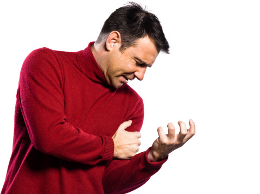Pain that is felt in the left arm and shoulder could be caused due to an injury, inflamed bursa in the shoulder, inflamed joint, or a heart attack. This write-up provides information on these conditions.

While trauma to the left arm or shoulder or repetitive stress injuries are responsible for causing pain in the shoulder and the left arm, pain might even arise due to certain medical conditions. Pain in this part of body is seen as a warning sign of a heart attack, if it is accompanied by a feeling of pressure in the chest. Therefore, medical assistance must be sought to identify the underlying cause of pain.
Contributing Factors
Pain in the left arm and shoulder could be caused due to the following conditions:
Injuries
The rotator cuff is a set of four muscles and tendons that attach the arm to the shoulder joint. If any of tendons attached to rotator cuff muscles in the left shoulder develop a tear, one is most likely to experience pain in the left shoulder. The pain can also radiate to the arm. Sports such as golf, rowing, baseball, or tennis involve repetitive use of the arms and shoulders, especially overhead movements that could put excessive stress on the shoulder joint. Those who play such sports are at an increased risk of sustaining such injuries.
Frozen Shoulder
Also called adhesive capsulitis of the shoulder, frozen shoulder is a condition that is characterized by pain, stiffness, and limited range of motion of the shoulder. It occurs when the shoulder capsule, which surrounds the ball-and-socket part of the shoulder joint, thickens and becomes tight. It is believed that this condition occurs due to the formation of scar tissue or stiff bands of tissue (adhesions), that affect the range of motion of the joint. Pain could also arise, if there is less synovial fluid in the joint. It might occur if the shoulder has been immobilized for a long period due to a shoulder injury or surgery.
Bursitis
Bursitis is another condition that could give rise to pain in the right or left arm. Bursae are small fluid-filled jelly-like sacs that perform the important function of minimizing friction between tendons, bones, muscles, and other tissues surrounding the joints. If the sac surrounding the left shoulder muscles gets inflamed, one is most likely to experience pain in the left shoulder and the arm.
Joint Diseases
Degenerative joint diseases such as arthritis, osteoarthritis, or osteoporosis can cause the joints to weaken. A person affected by such diseases could develop bony outgrowths called bone spurs. These outgrowths might form at the meeting point of bones, ligament, or tendons. These can rub against the surrounding nerves and cause pain. If a bone spur develops around the left arm or shoulder, one could experience pain. Cervical spondylosis, which is a condition associated with the degeneration of cervical spine, can also cause abnormal sensations in the arms and shoulders.
Cardiovascular Disease
If chest pain is accompanied with pain that radiates to the left arm and shoulder, it might be indicative of cardiovascular diseases. Coronary disease is one of the common causes of left arm pain in women. A heart attack occurs when the flow of blood to the heart gets blocked. This causes pain in the chest. The pain can also get referred to the left arm as well as the shoulder.
If you recently suffered from an arm or shoulder injury, make sure that you get yourself medically examined. An X-ray examination can help the doctors ascertain the extent of damage. Since pain in the left arm and shoulder could be caused due to other reasons, it's essential that the underlying cause be ascertained. While joint diseases could also give rise to pain in right arm and shoulder, if one is experiencing pain in the left arm along with chest pain, the wise thing to do would be to consult a cardiologist.
Disclaimer:
The information provided in this article is solely for educating the reader. It is not intended to be a substitute for the advice of a medical expert.


 While trauma to the left arm or shoulder or repetitive stress injuries are responsible for causing pain in the shoulder and the left arm, pain might even arise due to certain medical conditions. Pain in this part of body is seen as a warning sign of a heart attack, if it is accompanied by a feeling of pressure in the chest. Therefore, medical assistance must be sought to identify the underlying cause of pain.
While trauma to the left arm or shoulder or repetitive stress injuries are responsible for causing pain in the shoulder and the left arm, pain might even arise due to certain medical conditions. Pain in this part of body is seen as a warning sign of a heart attack, if it is accompanied by a feeling of pressure in the chest. Therefore, medical assistance must be sought to identify the underlying cause of pain.